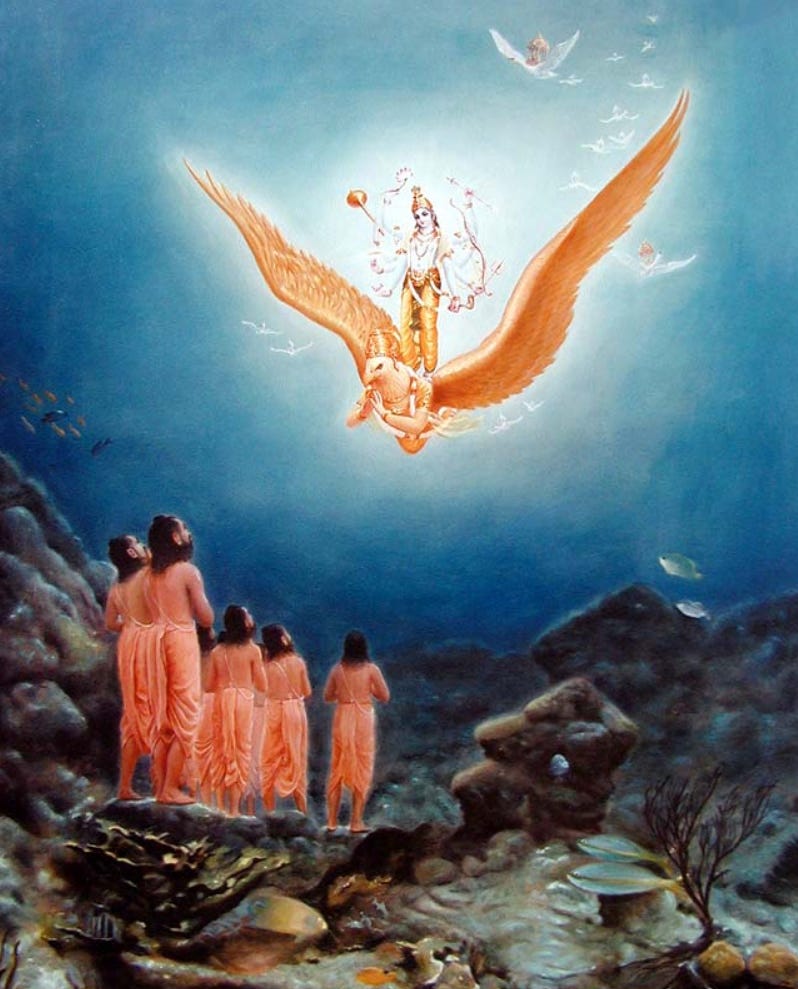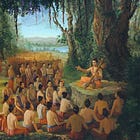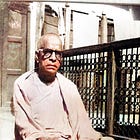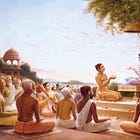Learning from the prayers offered by the Pracetas
The Pracetas offered their heartfelt prayers to the Lord. Just as in other similar passages, these prayers are full of meaning, conveying the devotional ecstasy of the brothers.
The story of the Pracetas is very central in the narration of the Srimad Bhagavatam. They are also extremely blessed, having personally met and been blessed by Lord Śiva, Lord Viṣnu Himself, and finally, Nārada Muni.
During their meeting with Lord Śiva, they were instructed on the prayers he himself composed to glorify Lord Viṣnu, and by meditating on these prayers for a very long period, they were capable of personally meeting the Lord.
During this occasion, the Pracetas offered their heartfelt prayers to the Lord. Just as in other similar passages, these prayers are full of meaning, conveying the devotional ecstasy of the brothers. It is described that they offered these prayers in a faltering voice, due to ecstasy.
This passage is found in chapter 4.30 of the Srimad Bhagavatam, going from text 22 to 32. Here are the main points:
The transcendental Lord (4.30.22-23):
After receiving the instructions of Lord Śiva and personally seeing the Lord, the Pracetas had no doubts about His personality. The Lord is full of transcendental qualities, and fully auspicious, and He is non-different from His holy name. Although a person, the Lord is unlimited and inconceivable by the material senses or mind. However, when the same senses and mind are engaged in devotional service, the Lord reveals Himself to the devotee. Bhakti is thus the true process for spiritual realization. One can't reach the Lord using his limited intelligence, but the Lord can very easily reach us when He is satisfied by our service.
Although the Lord appears to be involved in the material creation, appearing as Lord Viṣnu and also indirectly as Lord Śiva and Brahma to take charge of the three material modes, the Lord is never affected by them. Similarly, devotees who fix their minds on the Lord remain unaffected by the modes. Even if they appear to execute material activities as part of their devotional service, they remain fully transcendental, free from material desires and a sense of proprietorship. A materialist sees the world as a place of enjoyment and thus becomes entangled, but a devotee sees everything as energy of the Lord, and thus uses everything in His service.
The Supreme Person (4.30.24):
Although Viṣnu, Śiva, and Brahma are manifestations of the Lord, they are not the same. Brahma is a living entity who, due to his past piet,y assumes an exalted form, where he is empowered by the Lord to perform the material creation, while Śiva is not an ordinary living entity, but also doesn't display all the potency of the Lord, sitting in the middle, just like yogurt compared to milk. Both Brahma and Śiva accept material bodies, but Lord Viṣnu is the Lord Himself, fully transcendental.
There are, however, many forms of Viṣnu. Which one is supreme? In addressing the Supreme Lord, the Pracetas use the world vāsudevāya kṛṣṇāya, indicating that Krsna is the original personality of Godhead, and all Viṣṇu expansions are His plenary portions or portions of His plenary portions. The Lord is all attractive and the source of all qualities. This means He also has a transcendental intellect. In which is it engaged? Hari-medhase: the Lord is always planning ways to deliver the conditioned soul from the clutches of māyā. For this purpose, He comes in different incarnations and entrusts His devotees with unlimited powers, so they can assist Him in His mission.
The source of everything (4.30.25-26):
The Pracetas already defined Krsna as the Supreme and the source of all incarnations. All His opulences, such as His yellow silken dhoti, are fully spiritual. Similarly, He possesses many qualities, but they are all fully transcendental. Now, they explain how the material world also sprouts from Him. Krsna expands into Mahā-Viṣnu, Whom expands into Garbhodakaśāyī Viṣnu, from Whom the universal lotus flower from which Brahma appears. Viṣnu is non-different from Krsna; therefore, one may say the lotus sprouts from Krsna's abdomen. The Lord is also present in everyone's heart; therefore, He is also Kṣīrodakaśāyī Viṣnu, the Supersoul. He guides all living entities, making them forget or remember Him, as they desire. Janmādy asya yataḥ: The Absolute Truth is He from whom everything emanates. This Absolute Truth is Krsna.
The teacher and the final destination (4.30.27-30):
Krsna appears in numerous incarnations to annihilate the demons and re-establish the principles of dharma. In this way, the Lord benefits both the pious and impious. He is merciful to all. If He is so merciful even to the demons, liberating them from material conditioning and placing them in His transcendental effulgence, what to say about His devotees? In fact, the confidential meaning of the Lord's appearance is to be directly associated with His devotees. Even to neophytes, who can't see His transcendental form, the Lord appears in the form of the arcā-vigraha, the deity. A pure devotee can see how the Lord is personally present in the form of the deity. A neophyte may not have the same vision, but this doesn't make the deity any less powerful. One may not understand the value of being engaged in the service of the deity, but the Lord accepts His service and takes him home.
The soul is infinitesimal, and there are an unlimited number of us. Still, even though the soul is so small, the Lord is personally present with all of us and knows all our desires. The Lord thus loves everyone and thinks about everyone. No one is left behind. Even when we become covered by deep ignorance, the Lord continues to make plans to deliver us. Even a materialist has his desires satisfied, what to say about devotees? Being present in the hearts of His devotees, the Lord understands our sincerity and makes all arrangements so that we can attain success. The Lord is thus apavarga-gurur gatiḥ, He is both the teacher and the final destination, freeing us from material existence, quickly reciprocating to any small service we may perform.
The true benediction (4.30.31-32):
The true benediction is for the Lord to be satisfied with us. The Lord had already stated that He was satisfied with the Pracetas, and on their part, they also revealed that they were fully satisfied in having the Lord as the ultimate goal of life. When a devotee is fully engaged in the service of the Lord, he feels so satisfied that there is no need for any separate benediction, just as when one takes shelter of a transcendental pārijāta tree (a kalpa-vṛkṣa), he can get anything he desires to his full satisfactions, and therefore there is no need of approaching any other tree.
The Pracetas thus revealed that they considered the presence of the Lord the most desirable benediction and that they didn't desire anything more. However, since the Lord desired to give them yet another benediction, it would not be proper to reject it. The Pracetas were thus puzzled about what to ask. They considered, however, that the Lord is unlimited, and therefore it would be improper to ask for anything less than an unlimited benediction, something of infinite value. In this way, the Pracetas teach us how to pray to the Lord and how to ask for benedictions. Often, we go to the Lord to pray for some insignificant material blessing, such as a better financial position, material education, a husband or wife, etc., but this is just like going to a king to ask for a pinch of ashes. It is not only unintelligent but even offensive. Instead, we should go to the unlimited Person to ask for something of unlimited value.
What is the invaluable benediction asked by the Pracetas? It is to be always able to associate with pure devotees, fully engaged in discussing the Lord's pastimes, for as long as they have to remain in this material world. Even a moment of this association is more valuable than anything in this material world, or even impersonal liberation; therefore, how could one calculate the value of continuously being in such an association? The Pracetas were thus not falsely modest in asking for it. They understood the value of what they were asking, and we should pray similarly.
The reason pure devotees do not desire even elevation to the spiritual planets is not just modesty, but the fact that they are already in direct association with Krsna. A person in such a platform already lives in the spiritual world; therefore, there is no need to ask for something one already has. As Prabhupada explains, although a pure devotee considers himself contaminated and unfit for being transferred to the spiritual world, there is no question of being contaminated, because devotional service itself is the transcendental position. As he concludes: "The conclusion is that a pure devotee is not anxious to stop the repetition of birth and death, but is always eager to associate with other devotees who are engaged in chanting and hearing about the glories of the Lord."
The characteristic of pure devotees is that they are always eager to glorify the Lord, and thus, when they come together, the most powerful spiritual discussions take place. Such discussions create a transcendental atmosphere so powerful that even conditioned souls become spiritually aware, and therefore forget all their material hankerings, at least for the time being. This implies that one may again forget if he returns to his materialistic activities after hearing for some time, but if one stays in the company of such pure devotees and continues hearing, one will remain fixed on the spiritual platform. If such discussions are so powerful that they can instantly elevate even conditioned souls to the Vaikuṇṭha platform, what to say about the benefit pure devotees derive from them? Therefore, being in the company of such pure devotees is the ultimate goal. Liberation is just a secondary result. As the Lord Himself explains: “My dear Nārada, actually I do not reside in My abode, Vaikuṇṭha, nor do I reside within the hearts of the yogīs, but I reside in that place where My pure devotees chant My holy name and discuss My form, pastimes and qualities.”
If you read this article to the end, give it a like or write a commentary. This makes Substack recommend it to more people.
Read also:






Hari bol Prabhu ji 🙏 very nice presentation and points . It really helps to preach devotees . Thank you prabhu ji